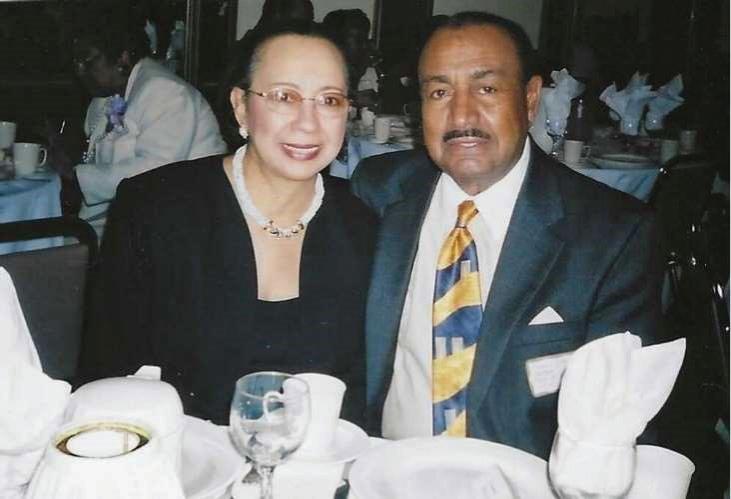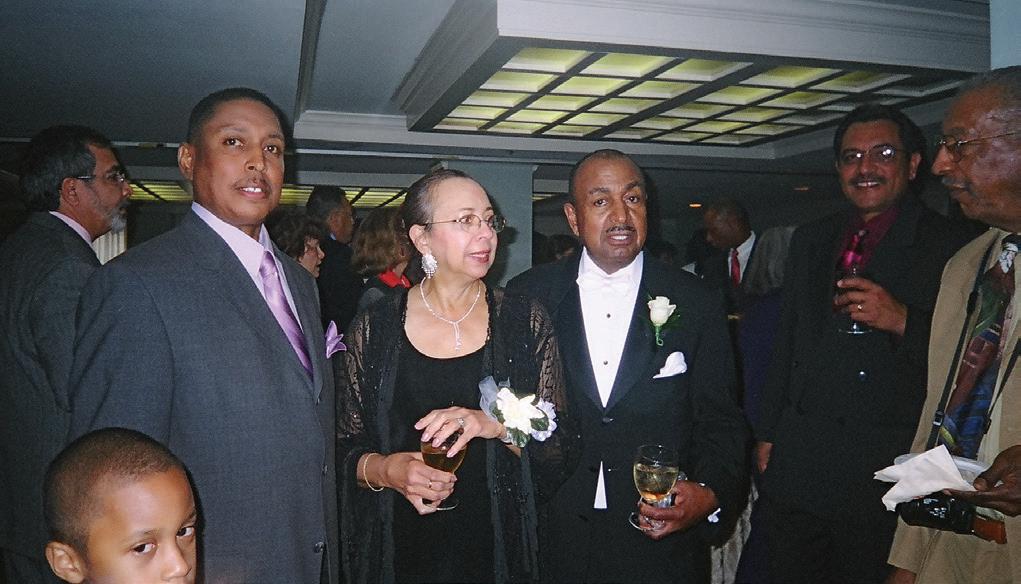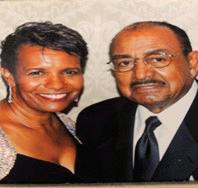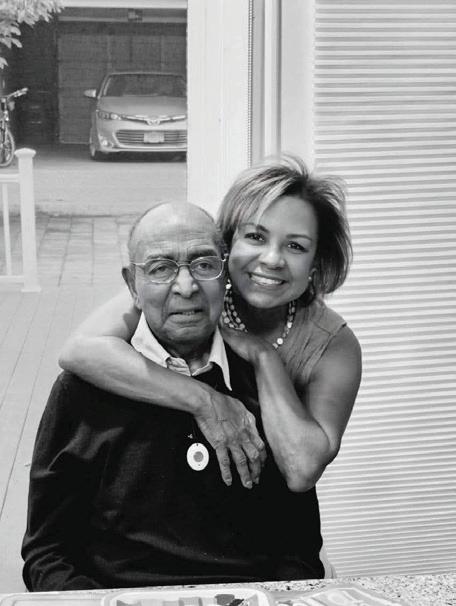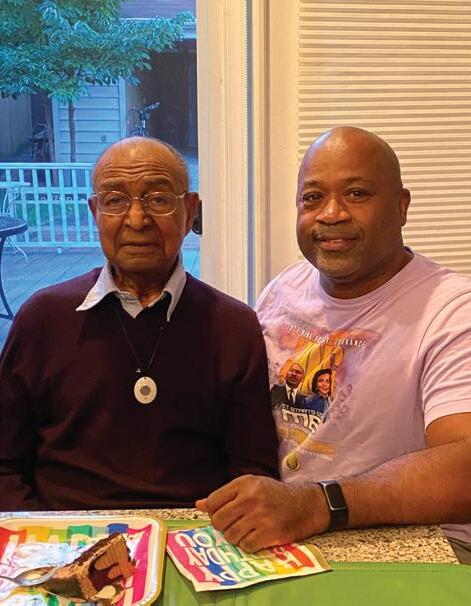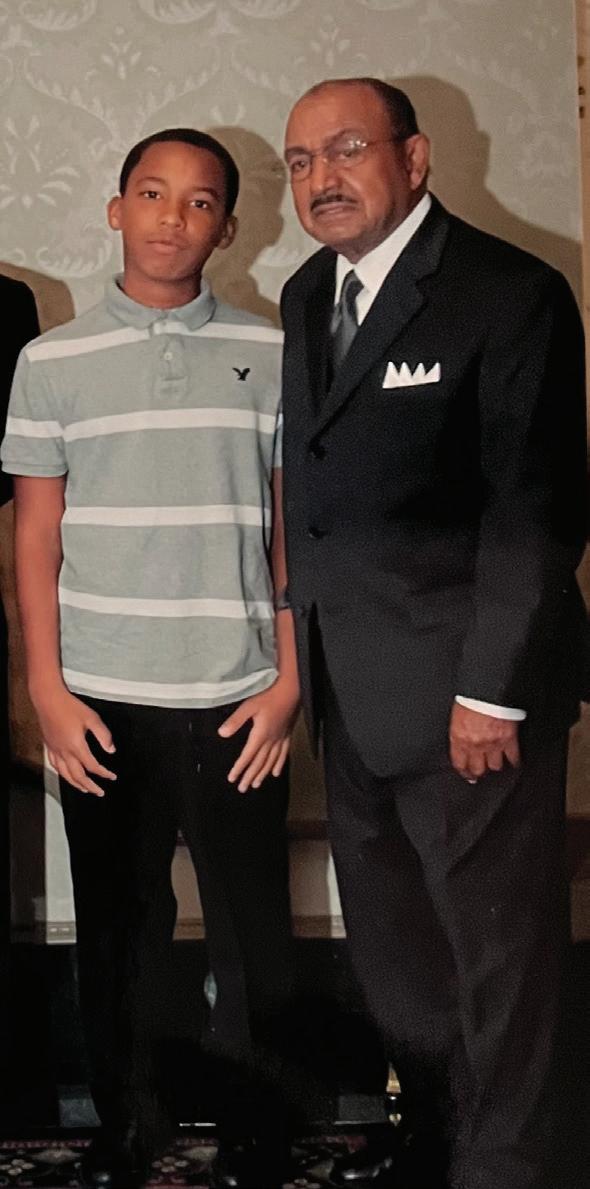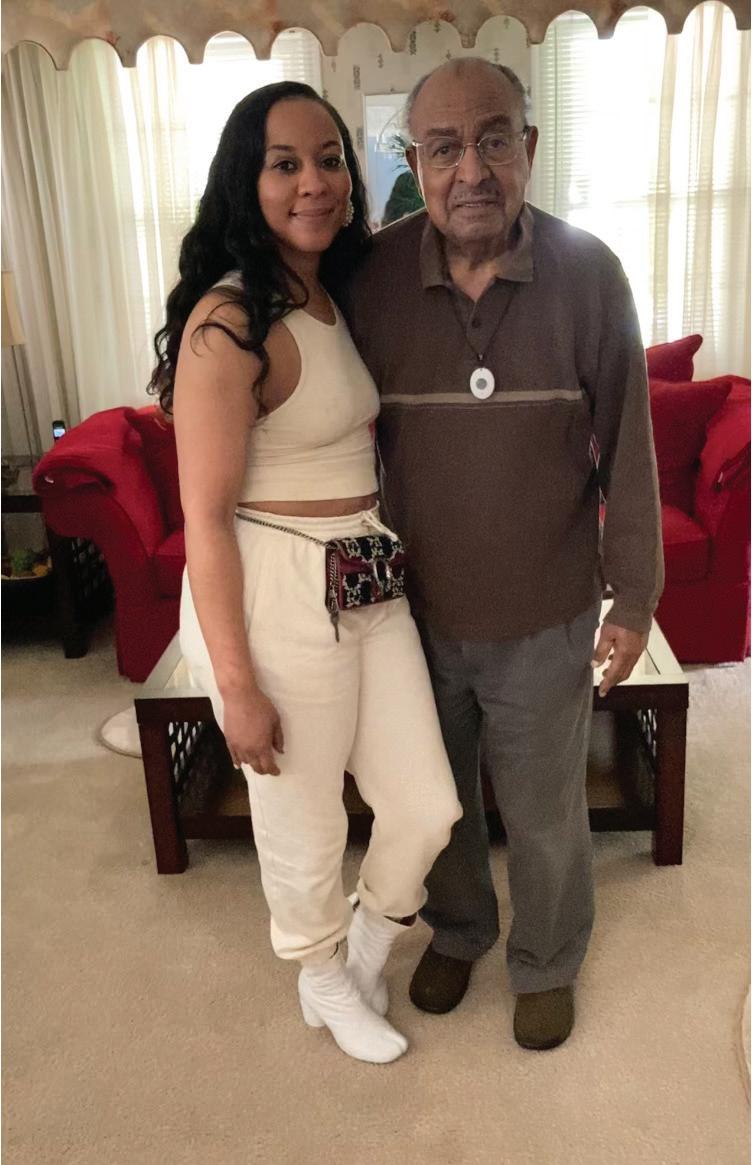ORDER OF SERVICE
Officiated by Reverend Pawel Sass, Pastor
Entrance Hymn “Blessed Assurance”
Greetings Reverend Pawel Sass
Old Testament Reading — Ecclesiastes 3:1-15 Mr. Rafael Lizárraga
Responsorial — Psalm 23 The Lord Is My Shepherd There Is Nothing I Shall Want
New Testament Reading — 1 Corinthians 13:1-13
Mr. Francis R. Yates III
Gospel Acclamation “Alleluia”
Gospel Reading — John 14:1-6
Homily
General Intercessions
Reverend Pawel Sass
Reverend Pawel Sass
Reverend Pawel Sass
The Lord’s Prayer All
Meditation Hymn “The Goodness of God”
Reflections The Honorable Charlene Drew Jarvis Mr. J .Christopher Yates
Final Commendation
Reverend Pawel Sass
Closing Hymn “Goin’ Up Yonder”
Music by Mr. Marvin Ford
Francis Robert “Bob” Yates, Sr. was born on September 14, 1931, in his childhood home at 34 Myrtle Street N.E. in Washington, D.C., as the youngest child of Matilda Curtis Yates and Ernest Albert Yates, a World War I veteran. He was predeceased by his siblings: Ernest “Junior” Albert, Jr., a World War II veteran, Ruth Spriggs, Australia Crump, and Curtis “Sonny” Marcellus Yates, a U.S. Army Korean War veteran.
Bob’s great maternal grandfather, James Curtis and his siblings, were enslaved in Manassas, Virginia until they received their manumission on October 6, 1828, when James was eight years old. He bore witness to the Civil War battles of Bull Run, raised his family, and built a life in this region. The Curtis family traced this branch of their genealogy to the late 1700s with photos and documentation.
The family persevered through the challenges of Jim Crow laws, segregation, and the Great Depression. After a few years, Bob and his mother moved to Fenton Street N.E. Nine people, sleeping three to a bed, lived in a small rowhouse without indoor plumbing or central heating. An oil stove in the living room, a wood stove in the dining room and a coal stove in the kitchen heated the first floor, but the second floor was unheated. Blankets and coats kept the family warm in bed, and when the electricity was cut off, oil lamps provided light. Every week, ice was delivered from a horse drawn wagon for their ice box. An outhouse in the backyard was used year-round. When toilet paper was scarce, newspapers were used. The family, like others in the neighborhood, had to use an outhouse in the backyard yearround. Fortunately, in 1951, the government required indoor plumbing, including running water and toilets in all D.C. homes.

Despite hardships, Bob often reflected on the kindness of local Jewishowned businesses, like the Robert and Esther Band Store, which allowed struggling families to open a tab for food and non-perishable goods.
Radio shows provided entertainment for the family, and billiards and ping-pong games at the neighborhood recreation center, where Bob learned boxing and judo, offered even more fun. On Fridays, the street was blocked off for dance parties. On hot summer days, open fire hydrants cooled the families and was a refreshing respite from the heat. Bob and his cousin, Anna, also danced on street corners and entertained patients in the hospital where his father worked, earning nickels, dimes, and quarters.
Fenton Street, affectionally called Swampoodle, was a lively close-knit community where everyone knew one another, and left a lasting memory for Bob. Gentrification removed this vibrant but economically poor community of Myrtle Street and Fenton Street, both located near Union Station in Washington, DC.
Bob’s resourcefulness and ambition emerged early. He contributed to his family’s income by shining shoes, doing housework for a teacher, briefly delivering telegrams for Western Union, and delivering newspapers on Saturdays. While delivering newspapers, he stopped in a Little Tavern restaurant and sat down to purchase food. The worker told him he could not be served sitting down. Bob walked out, refusing to eat standing up.
Junior high school was a turning point for Bob. During these years, he became a Boy Scout and converted to Catholicism. Every second Sunday, the missionaries from the Salesians Order held retreats for the young boys. With the missionaries, the young participants would pray, play games, enjoy meals, and travel to New York City. This period was life-changing, giving Bob a glimpse of what he could achieve—despite the entrenched discrimination of
1
Fenton Street, NE Washington, DC (picture from the Library of Congress Archives)
that era. In high school, Bob’s work experience expanded when he became a busboy and a waiter at the U.S. House of Representatives cafeteria. While working there, he often enjoyed eating the official “Capital Bean Soup” invented in 1904 and still served today.
On June 23, 1951, Bob married his high school sweetheart, Jaunice Ann Wright, whom he met at Cardozo High School.
Bob and Jaunice lived in Northeast D.C. for 10 years, raising their first four children, Francis Robert Jr., Ricardo Anthony, Mitzi Maria, and Kim Anita. In 1961, the Yates family moved to their current home on 8th Street N.W in the Takoma Park neighborhood of D.C. One year later, Kelli Julianna was born, and the following year, Jacy Cabrina was born. Bob and Jaunice provided a solid foundation for their six children. Sunday Mass services, meals around the dining room table, entertainment, and beach vacations were part of family life.
Between raising his family and working, Bob completed two years of a college education in data processing and computer programming courses. He remained committed to continuous learning and professional development throughout his life. To supplement his income, Bob catered events, including the opening of Washington Dulles International Airport in 1962. He was dedicated to physical fitness. Boxing, his favorite sport, jogging, lifting weights, and bike riding were among his favorite hobbies.


When relaxing at home, Bob enjoyed watching track and field, boxing, and the former Redskin football team (now Commanders). Bob and Jaunice loved to dance and attend cabarets. They hosted backyard cookouts, dance parties and other gatherings—where chicken, potato salad, and green beans were often on the menu—and Bob enjoyed not only showcasing his own dancing skills, but teaching Robert, Ricky, and Mitzi to merengue and cha-cha. Bob loved traveling with his wife and enjoyed many trips to her birthplace of New Orleans, as well as San Diego, Los Angeles, Orlando, Virginia Beach and their second home in Atlantic City only one block from the beach.
Wedding Day
Christmas (circa 1964)
East Potomac Pool at Hains Point
Jaunice and Bob Mitzi and Rafael’s Wedding Family home in N.W. Washington D.C.
Driven by the novelty of doing something new, the challenge of problem solving, and innovative thinking, Bob was drawn to the burgeoning field of computer technology. Bob’s industrious and ambitious spirit guided him to an extensive career in Information Technology (IT) beginning at the National Security Administration (19551967). In 1958 he traveled to Frankfurt, Germany as part of a team that installed computer systems at the IG Forbyn NSA building.
In 1967, Bob began his career in leadership positions with the D.C. Government, where he served for 19 years before retiring as the Associate Director in the Department of Employment Services. He was responsible for consolidating all DC mini-computer centers with the Department of Employment Services and Share Computing Services under Mayor Walter Washington and Mayor Marion Barry. He was often referred to as the “Computer Boss” for the government of the District of Columbia. From 1987 to 1994, Bob was the Assistant Executive of Information Systems at Howard University. Beginning in 1994 until he retired in 2004, Bob was an independent IT consultant, winning contracts with the DC Government, Lockheed Martin, and Southeastern University. He left a lasting impact in the field of IT and was admired for his knowledge, collaboration, kindness, and vibrant personality, and he was appreciated for helping talented people find jobs and launch their careers.
While Bob enjoyed his work, he was known for his unwavering dedication to family, public service, and his community. For 15 years, he served with the Metropolitan Police Department’s Reserve Corps, advancing to Captain. During the riots after the 1968 assassination of Dr. Martin Luther King, Jr., Bob worked several night shifts to help protect the community.


Bob volunteered to teach computer skills and dance classes at Nativity Catholic Church’s afterschool and summer programs, where he was also instrumental in updating the church’s website. Additionally, he was a Fourth-Degree member of Knights of Columbus, a Catholic organization that empowers men to live their faith at home, in their parish, at work and in their community. Many of the neighborhood children looked to Bob for inspiration as a one-of-a-kind neighborhood dad and mentor who also assisted them in finding jobs in D.C. Government. His giving spirit extended to political work, and he was affectionately known as “Ward 4 Bob.” He worked on numerous political campaigns, including Arrington Dixon’s and Charlene Drew Jarvis’ successful campaigns for
Atlantic City Beach House on Caspian Avenue
Working as an MPD Reserve Police Officer
One of many catering jobs
the D.C. City Council. In addition, Bob served on the Board of the District Government Employees Federal Credit Union for 40 years including 10 years as Chairman of the Supervisory Committee as well as service on the Information Technology Committee.
His beloved wife passed away in 2009 after 58 years of marriage. At 79 years old, Bob joined the Banneker Ballroom Dance Club of D.C. where he met his devoted companion, Fern Underdue. Bob and Fern enjoyed dancing salsa, the waltz, the rhumba, the foxtrot, and D.C. hand-dancing. Together they attended weekly jazz and blues concerts at Westminster Presbyterian Church, and traveled extensively to several places, including Negril, Jamaica.
Bob is predeceased by his beloved wife, Jaunice Ann Yates and their son Ricardo Anthony Yates. Bob is survived by his children, Francis Robert Yates, Jr. (Agnes), Mitzi Yates Lizarraga (Rafael), Kim Johnson (Anthony, deceased), Kelli Yates (Ulysses), Jacy Yates, Trina Brown (Philip), Eric Mathis, and Otis Cortier Ware; his devoted companion, Fern Underdue; 20 grandchildren, 37 great grandchildren and 4 great-great grandchildren; and 8 bonus grandchildren, 16 bonus great grandchildren and a host of nieces, nephews and cousins.
Bob faded away peacefully surrounded by love. He leaves behind a multi-generational legacy of kindness, wisdom, and integrity that will forever remain in the hearts of those who knew him. Bob once said, “I have not been a perfect man and there are other important parts of my life story that are complicated, and I can’t easily explain, maybe later. I have had a good life. When it’s my time, I’d like to just fade away.”
PALL BEARERS
Francis Robert Yates III
Larry Raphael Odom
Jason Antoine Yates, Sr.
James Christopher Yates
Ronald Keith Hobson II
Amir Alexander Hobson
INTERMENT
Interment follows immediately after the service at Fort Lincoln Cemetery 3401 Bladensburg Road
Brentwood, Maryland 20722
REPAST
Family and friends will gather for repast at 2:00PM (following the interment)
DoubleTree Hotel by Hilton 8777 Georgia Avenue
Silver Spring, Maryland 20910
e Yates family appreciates your prayers, sympathy and unwavering support during our time of grief. ank you for your overwhelming expressions of love, kindness, support, comfort, and condolences during this period of bereavement. e calls, visits, cards, gifts, flowers and other expressions of kindness encourage us and give us a source of strength in the days and months ahead. We thank you for being a part of Bob’s life journey. Many thanks to Fern Underdue who captured and compiled many conversations with Bob about his life story.
A special thanks is extended to Home Instead Senior Home Caregivers and VITAS Hospice Healthcare.
ARRANGEMENTS ENTRUSTED
is program was designed and printed in loving memory of Mr. Francis Robert Yates, Sr. by Papered Wonders, Inc.











